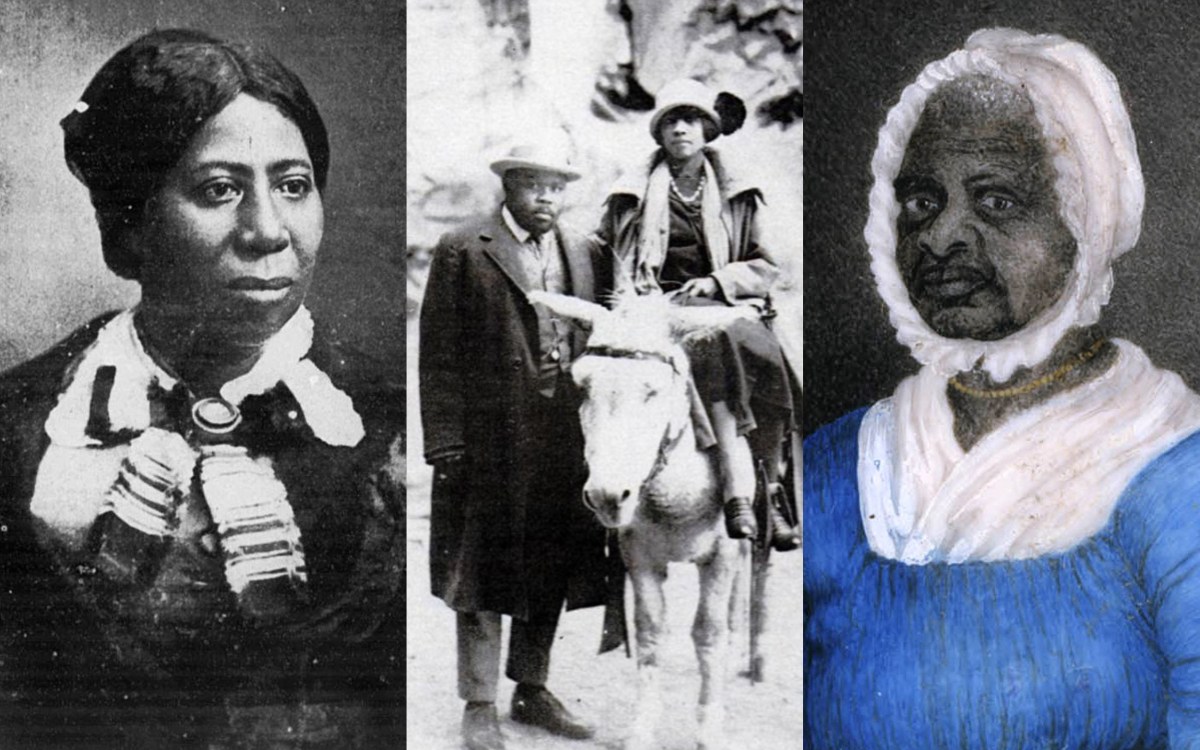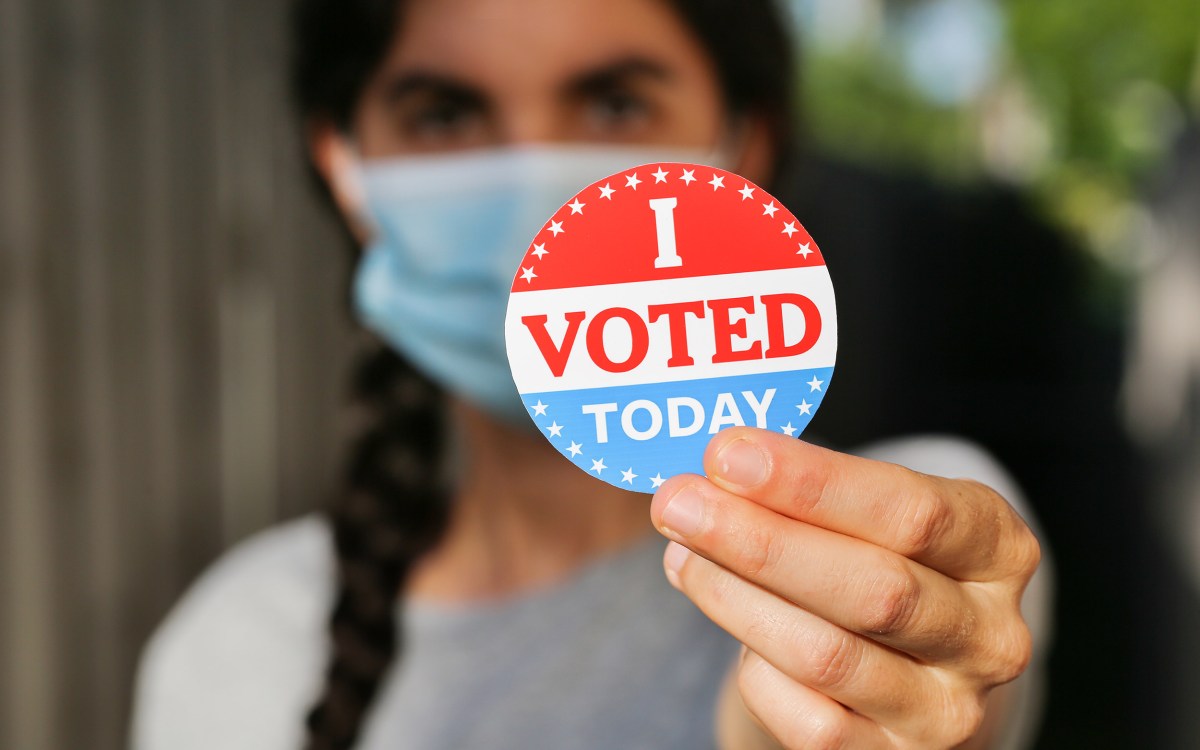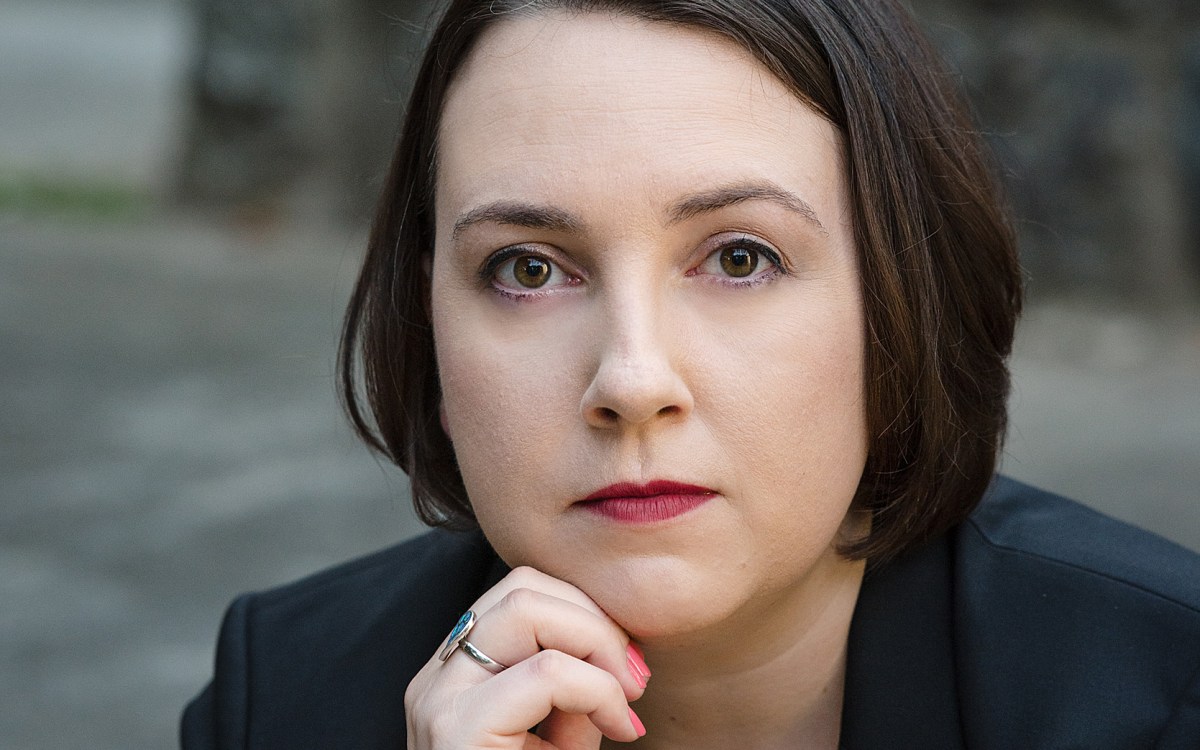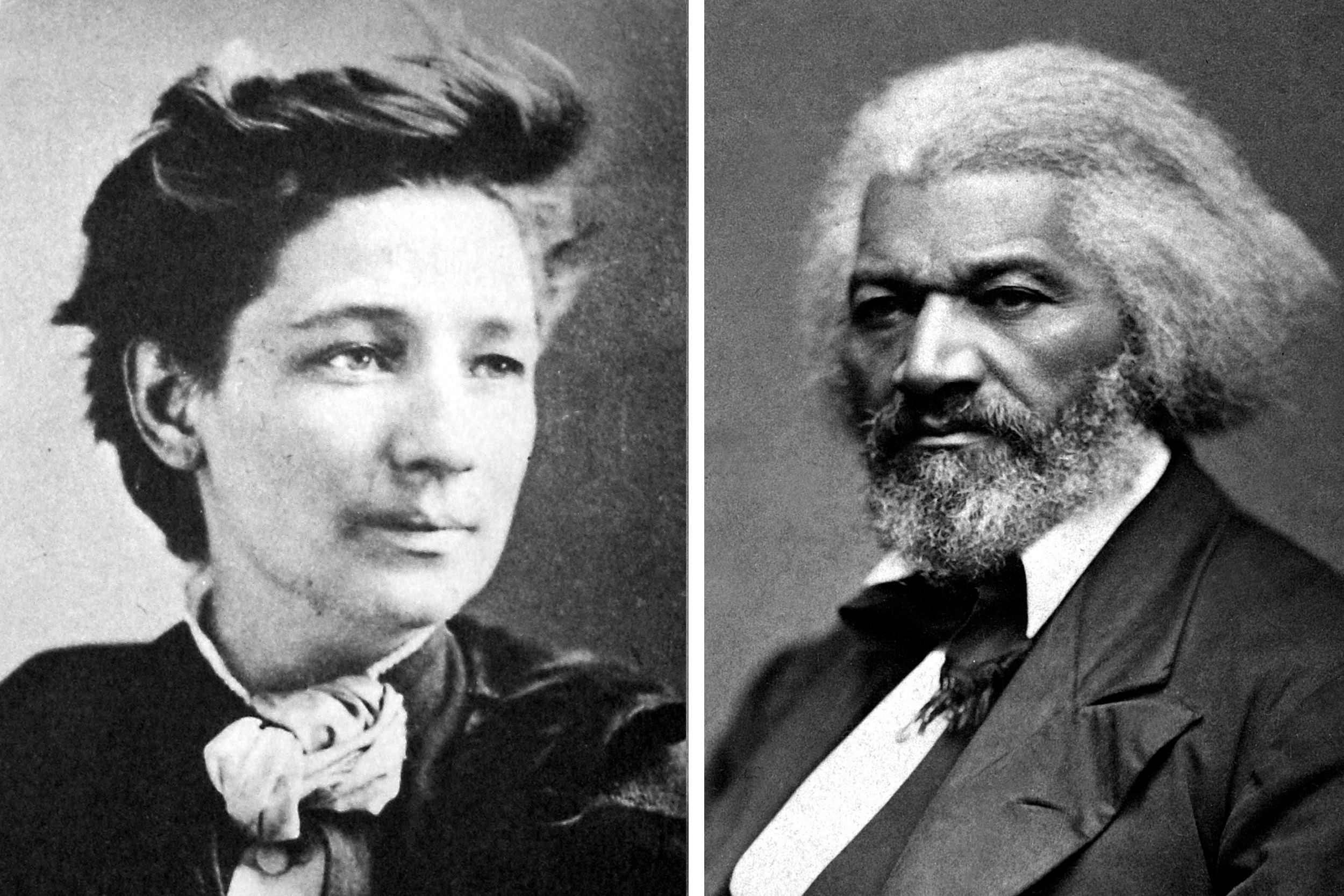
Victoria Woodhull, who ran for president against Ulysses S. Grant, chose abolitionist Frederick Douglass as her running mate in the 1872 election.
Photos (left) by Matthrew Brady circa 1860; (right) courtesy of the National Archives and Records Administration/Public Domain/
Recalling another strange, historic election
She was to be first woman president; he the first Black VP. Only no one told him
This year’s riven, pandemic-complicated election has been unusual on many fronts and undeniably historic, marking the first time a woman of color has been nominated for vice president by a major political party. But there have been other surprising contests in the nation’s history.
American saw its first woman presidential nominee and its first Black vice presidential pick in 1872, just seven years after the end of the Civil War. All of it was owing in large part to the women’s suffrage movement and radical feminist Victoria Woodhull, who ran for president against the incumbent, Ulysses S. Grant, as the nominee of the Equal Rights Party and chose (without his knowledge or consent) abolitionist Frederick Douglass as her running mate. For Woodhull, a polarizing political activist who was considered an eccentric by many, it would be the latest of many firsts — a self-declared clairvoyant, she had already been the first woman in the country to own a brokerage firm and to start a weekly newspaper.
“She was a fascinating celebrity and well-known character,” said Susan Ware, an independent scholar who is helping curate an upcoming exhibit at Radcliffe’s Schlesinger Library on women and office-holding in the U.S. “I’m sure that women as well as men were following her career with interest and excitement and sometimes horror, but she definitely was very good at getting her name out there.”
It was Woodhull’s support of “free love” — the idea that women and men should be able to freely choose their sexual partners without interference from the state — that many found most controversial. But those beliefs were in keeping with her support for women’s rights more broadly, and her run for the presidency was more than a publicity stunt, said Ware.
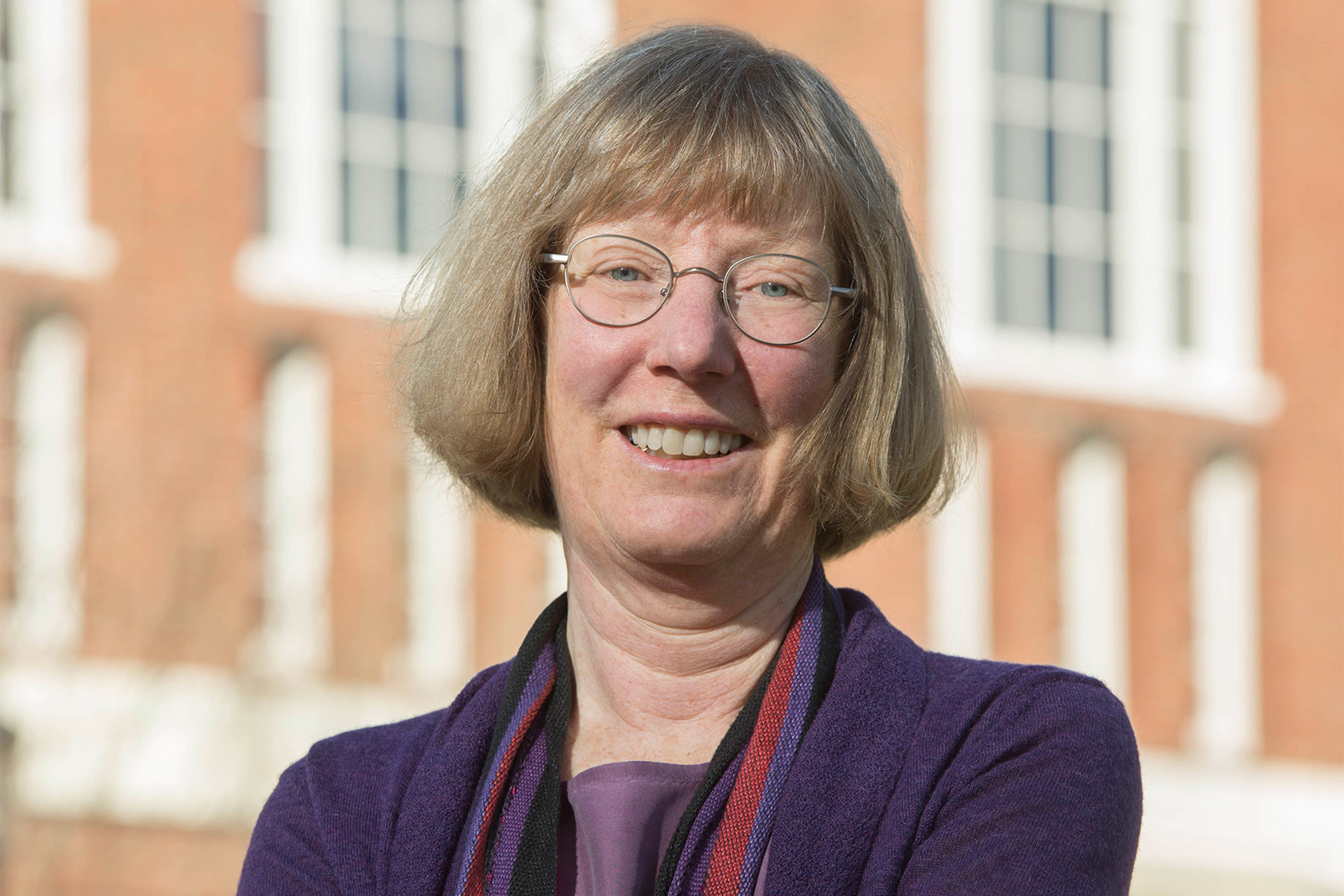
Woodhull’s candidacy was designed to highlight the argument made by suffragists that women already had the right to cast a ballot thanks to the recent passage of the 14th and 15th Amendments to the U.S. Constitution, which affirmed that everyone born in the country was a citizen and that no citizen should be denied the right to vote. But government authorities rarely agreed with that interpretation. After Susan B. Anthony cast a vote in Rochester, N.Y., for Grant that November, she was arrested, tried, found guilty, and issued a fine that she refused to pay. (Earlier this year President Trump pardoned Anthony, a move that angered many women who argued that the famous social reformer would have wanted her conviction to stand as a symbol of women’s rights.)
Anthony’s effort was “part of a larger strategy of the suffrage movement to basically say, ‘Women already have the right to vote. We just need to seize it,’” said Ware. “Woodhull is part of that … and what better way to make that point than to run for president?” (In a twist that seems oddly predictable, Woodhull wasn’t able to vote for herself on Election Day, having been jailed for publishing obscene material in her newspaper: a feature on the adulterous affair of influential clergyman, social reformer, and Congregational minister Henry Ward Beecher.)
But while Woodhull was clear about her presidential intentions, she never informed her running mate, Douglass, who never even acknowledged he had been nominated. Many have speculated that Douglass didn’t want to recognize the nomination for fear of being associated with Woodhull, who was seen as “a loose cannon and controversial even among radical feminists and abolitionists,” said Harvard historian John Stauffer.
“For Douglass, so much was about the specific context. ‘What can I accomplish?’ He was a prudent revolutionary. If he decided to do something, he always analyzed what potential progress” could be made, said Stauffer, Harvard professor of English and African and African American studies and author of two books on Douglass. “That’s probably the best way to describe his refusal to attend Woodhull’s convention or even respond, because the potential good or progress he could gain from acknowledging and participating in this vice presidential [bid] is basically nil, and possibly it might have had negative effects.”
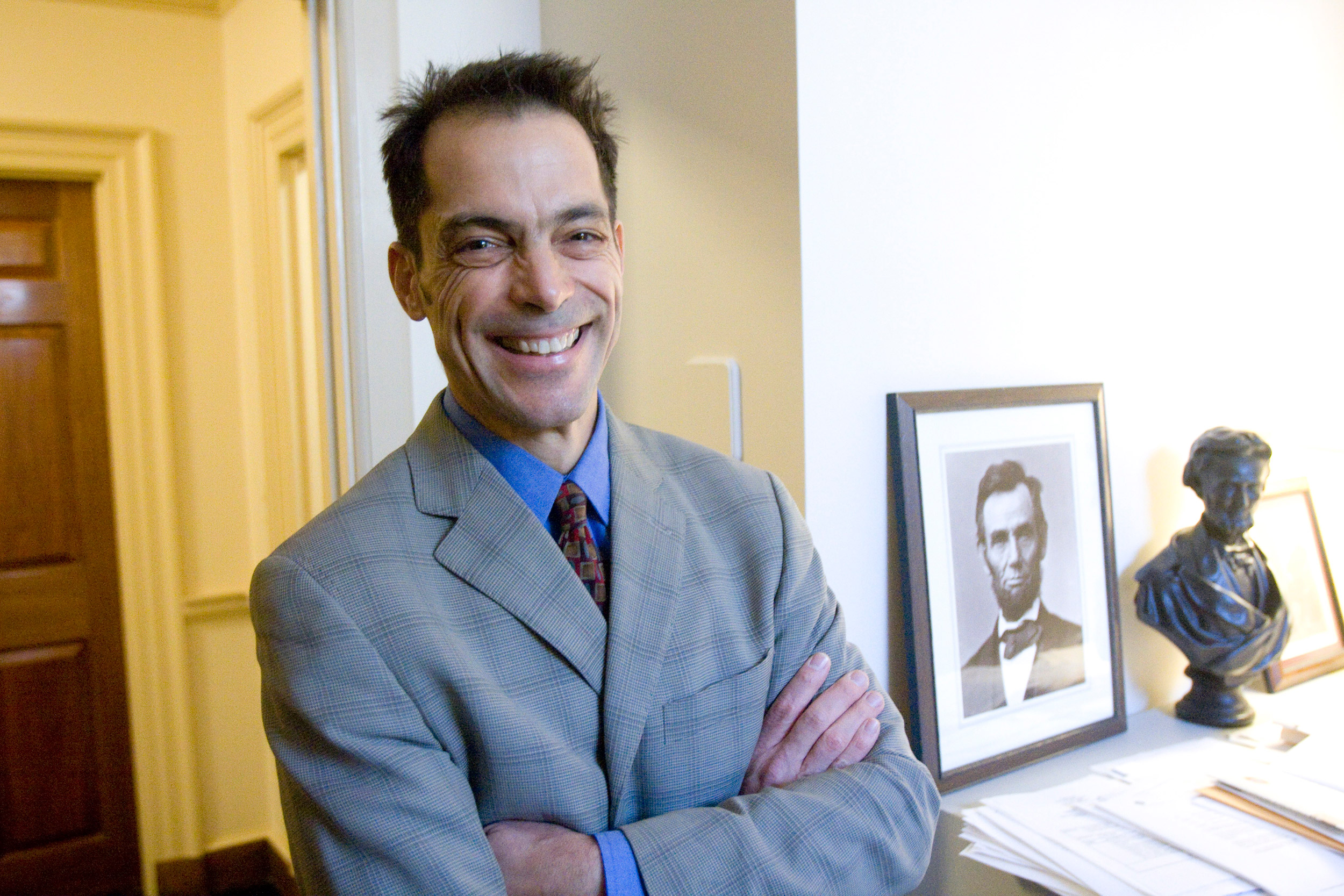
“Douglass’ influence, and frankly, his brilliance is that he understood the difference between being a radical activist and being a politician with access to the seats of power,” said John Stauffer. Kris Snibbe/Harvard file photo
Harvard University News Office
While Douglass may have harbored higher political aspirations, he never officially held an elected office, though he would go on to became federal marshal for the District of Columbia, recorder of deeds, and minister resident and consul general to the Republic of Haiti, as well as an influential presidential adviser.
“Douglass’ influence, and frankly, his brilliance is that he understood the difference between being a radical activist and being a politician with access to the seats of power,” said Stauffer. “He advises every president from Lincoln until his death and 1895. So, he has access to these levers of power.”
Douglass also likely didn’t recognize the vice presidential nomination in 1872 because he was already supporting a different presidential candidate, said Kenneth Mack, a historian and Lawrence D. Biele Professor of Law at Harvard Law School. A loyal Republican, Douglass had backed Grant’s run for a second term. During his first four years in the White House, Grant had proven himself a champion of the rights of freed African Americans, having supported several Civil Rights acts in 1870 and 1871, including one designed to the end Ku Klux Klan’s reign of terror against Black people in the former confederate states. “And President Grant had supported sending in the Union army to protect the lives and the votes of Black people in the south. So, for Douglass, there was no real choice other than to support Grant.”
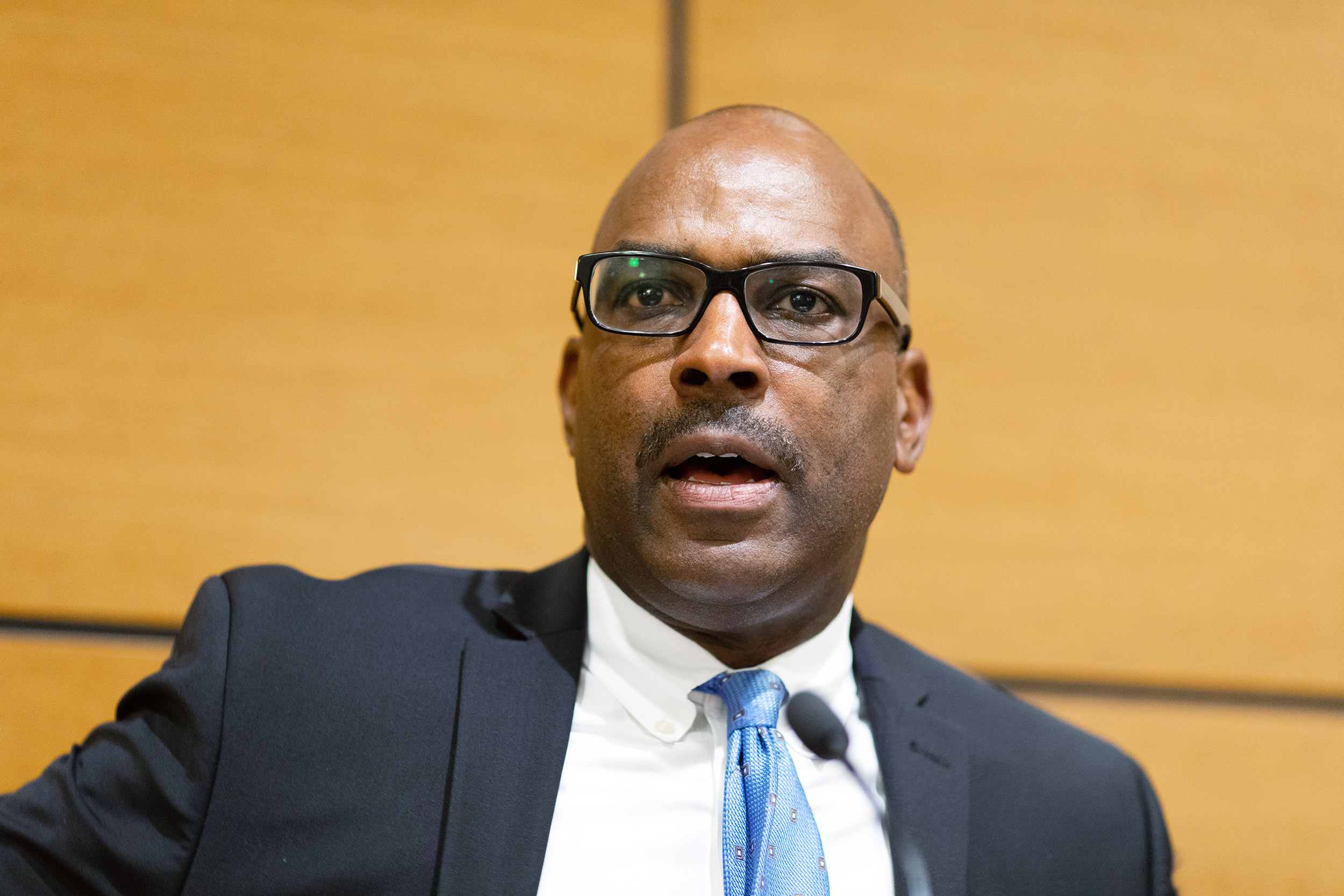
“President Grant had supported sending in the Union army to protect the lives and the votes of Black people in the south. So, for Douglass, there was no real choice other than to support Grant,” said Ken Mack. Lorin Granger/Harvard Law School
Lorin Granger/Harvard Law School
Douglass was a lifelong supporter of women’s suffrage despite splitting with activists in his support of the 15th Amendment, which gave Black men the vote but left women disenfranchised. “Thousands of Black people were being murdered across the South. And Douglass gave his famous speech saying, ‘This is a matter of life and death,’ and he really meant life and death,” said Mack.
The rift highlights another driving force in the woman’s suffrage movement involving Black women whose efforts to help women secure the right to vote have long been overlooked. As a recent piece in the New York Times noted, Black women’s rights and access to power have continued to lag behind those of other groups.
What would Douglass have thought of the country’s recent elections? “It’s impossible to translate from the 19th century to today … but certainly the principle that Douglass stood for, that the most vulnerable people in our society should have access to the ballot in order to protect their interests, that ballot access should be expanded rather than contracted, was his position all the way through. And he supported women’s suffrage because he thought that women needed the ability to look out for their own interests rather than to supposedly have men look out for them,” said Mack.
He sees Woodhull as a 19th-century version of a “kind of radical libertarian reformer who believes that people deserve autonomy and the ability to look out for their own interests.”
In the end, Grant won a second term by a resounding margin, defeating Woodhull and the Democratic Party’s nominee, Horace Greeley, the famous newspaper editor and founder of the New York Tribune. Heartbroken, Greeley died later that month, before the Electoral College met to formally declare Grant the winner.
Ultimately, it would take the ratification of the 19th Amendment in 1920 before women throughout the U.S. secured the right to vote, though it would take another 45 years before Black women were able to exercise that right. And it wasn’t until 2008 when Barack Obama became the first Black man elected to one of the nation’s two highest offices. Woodhull’s dream of a woman president, however, remains unfulfilled.



